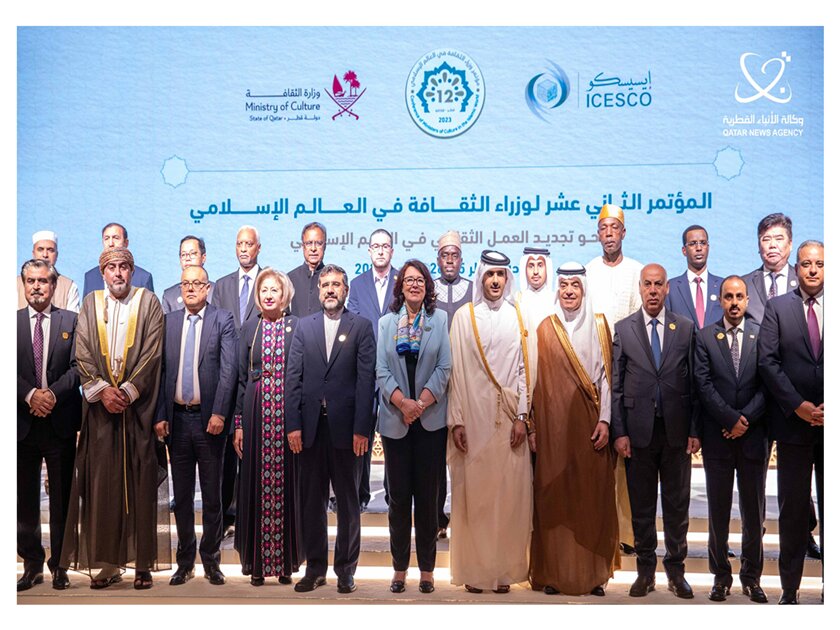TEHRAN-Iran’s Minister of Culture and Islamic Guidance proposed establishing a secretariat for cultural dialogue among the member states of the Islamic World Educational, Scientific and Cultural Organization (ICESCO) on Monday in Qatar.
Mohammad Mehdi Esmaili made the remarks in an address to the 12th Conference of Ministers of Culture in the Islamic World in Doha, ISNA reported on Monday.
“To protect our cultural, artistic, moral and spiritual assets, we need to share our ideas and activities through cultural dialogues and try to benefit from each other's strengths. The secretariat can serve as a platform to exchange experiences in scientific and cultural the fields,” he noted.
He suggested that the new secretariat can be formed under the umbrella of the secretariat of ICESCO, which is a specialized organization concerned with fields of education, science, culture, and communication in Islamic countries to bolster relations among 54 member states based in Asia and Africa.
“If approved, Iran is ready to host the first round of such cultural dialogue as there are many common cultural and artistic issues between the Islamic nations, and a cultural synergy can be reached through negotiation and consensus,” the minister added.
The minister underlined that what the world needs now is morality and spirituality as turning a blind eye to morality and spirituality has resulted in the formation of Takfiri and extremist groups in the world.
“Desecration of the Holy Quran in Sweden and other parts of the globe has indicated that those who are opposed to Islamic unity resort to any measures to create a rift among Islamic nations,” Esmaili asserted.
“In line with the convergence of the Quranic society, Iran is to hold the first International Congress of Quran Scholars in October. We have sent an official invitation to the culture ministers and religious authorities of Muslim countries, but I want to use this opportunity and invite all the dignitaries here to participate in the congress,” he said.
Elsewhere in his speech and referring to Palestine, he urged the necessity for the Islamic societies to use their potentials to provide support for the Palestinian cause.
He also stressed that the Holy Qods, for its high position, has to stay away from religious rivalries and hostilities.
“I ask the present Islamic countries to attend the Palestine’s International Prize for Literature, whose first edition was held last year in Beirut, Lebanon, and be the narrator of the oppressed voice of the Palestinian nation and their brave resistance against the Zionists,” he stated.
Religion of peace
Also speaking at the event, the former UNESCO Director-General Irina Bokova, who attended the conference as guest of honor, hailed Islam as a religion of peace and Islamic civilization as a driver for rapprochement among cultures.
She said that Islamic values promote science, culture, and civilizational interaction. Praising Qatar's FIFA World Cup 2022 hosting, Bokova said the State of Qatar had turned the global mega event into a dialogue of cultures.
Bokova lauded ICESCO's efforts in preserving heritage, supporting youth and women, and partnering with UNESCO to achieve many goals.
The 12th Conference of Ministers of Culture in the Islamic World was held on September 25 and 26 under the theme “Toward renewing cultural action in the Islamic world”.
In the two-day conference, the main principles of cultural policy and indicators of sustainable development as well as the expansion of joint cultural activities in combating the illegal trafficking of cultural heritage were discussed.
ICESCO was founded by the Organization of Islamic Cooperation (OIC) in 1979. Its headquarters is located in Rabat, Morocco.
ICESCO's objectives are to strengthen and promote cooperation among the member states in the fields of education, science, culture and communication; consolidate understanding among peoples inside and outside member state; contribute to world peace and security through various means; publicize the true image of Islam and Islamic culture; promote dialogue among civilizations, cultures and religions; encourage cultural interaction and foster cultural diversity in the Member States, while preserving cultural identity and intellectual integrity.


No comments:
Post a Comment